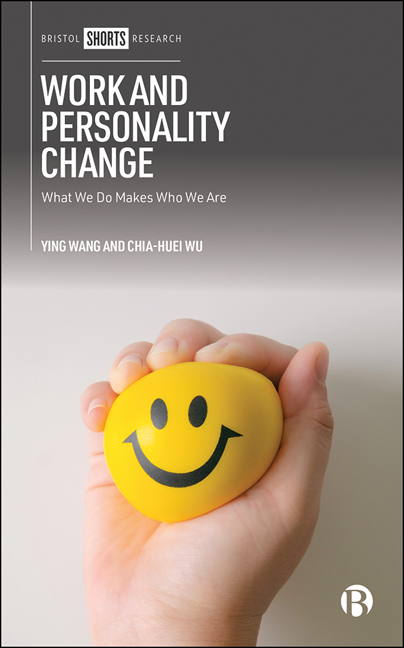Book contents
- Frontmatter
- Contents
- List of Figures
- Notes on Authors
- Preface
- one What Personality Is and Why It Matters for Organisations
- two Can Personality Traits Change, and How? A Review of Personality Development Literature
- three How Work Experiences Drive Personality Change: The Impact of Work, Organisational, Societal and International Environment
- four Intentional Personality Change: Individual Agency in Change and Interventions for Change
- five Implications of Personality Change at Work for Research and Practice
- References
- Index
four - Intentional Personality Change: Individual Agency in Change and Interventions for Change
Published online by Cambridge University Press: 04 January 2022
- Frontmatter
- Contents
- List of Figures
- Notes on Authors
- Preface
- one What Personality Is and Why It Matters for Organisations
- two Can Personality Traits Change, and How? A Review of Personality Development Literature
- three How Work Experiences Drive Personality Change: The Impact of Work, Organisational, Societal and International Environment
- four Intentional Personality Change: Individual Agency in Change and Interventions for Change
- five Implications of Personality Change at Work for Research and Practice
- References
- Index
Summary
In Chapter 3, we reviewed studies that investigated how individuals’ personality development is influenced by a wide range of external factors. These longitudinal studies primarily focused on personality change as a relatively passive process that requires a substantial length of time for such effects to occur. However, is there a possibility for personality change to be more actively facilitated within a shorter period, such as through purposefully designed interventions? While this idea may sound bold and potentially controversial from the personality psychology perspective (Mroczek, 2014), clinical psychology had long been operating under the assumption that personality, such as traits associated with depression and anxiety, can be changed through different intervention strategies (see Chapman et al, 2014, for a brief review).
The idea that personality change can be undertaken in a more active way is also in line with the agency perspective. It is not hard to understand that, as human beings, we are not merely ‘pawns’ of the environment and the demands life places upon us; instead, we can be active agents in initiating and driving our own personality change (McAdams & Olson, 2010; Denissen et al, 2013; Scarr & McCartney, 1983). An example of this can be seen in the vast amount of self-help books and training programmes available on the market, which have been suggested to be a $10 billion industry in the US alone (LaRosa, 2018). Indeed, self-pursued personality change is not only possible but desirable for many people who are motivated to improve themselves and willingly invest time, money and energy in doing so.
In this chapter, we will focus on how personality can be changed in a more active and intentional way, by discussing individuals’ agency in this volitional change process and by understanding how interventions can be designed to facilitate such a change. The emerging nature of this area means that existing research specifically on interventions that change personality in work and vocational settings is very sparse. Therefore, we will draw evidence from the broader personality psychology literature, with the aim of providing insights for academics and practitioners working on personality change in the work and professional context.
- Type
- Chapter
- Information
- Work and Personality ChangeWhat We Do Makes Who We Are, pp. 63 - 84Publisher: Bristol University PressPrint publication year: 2021

